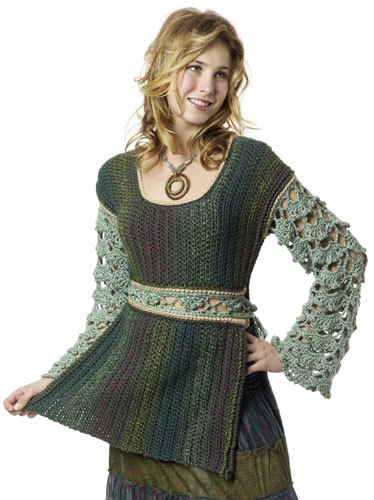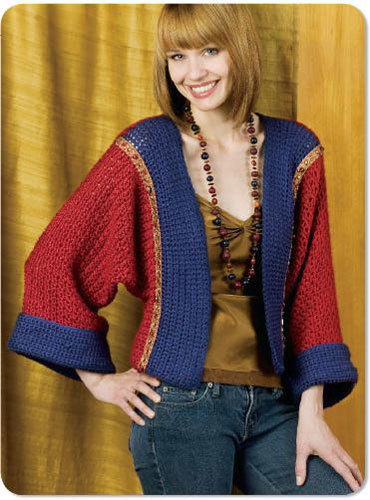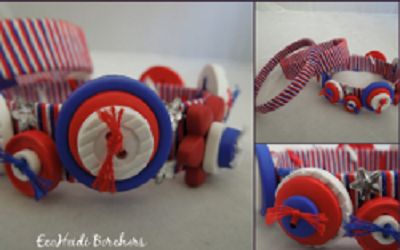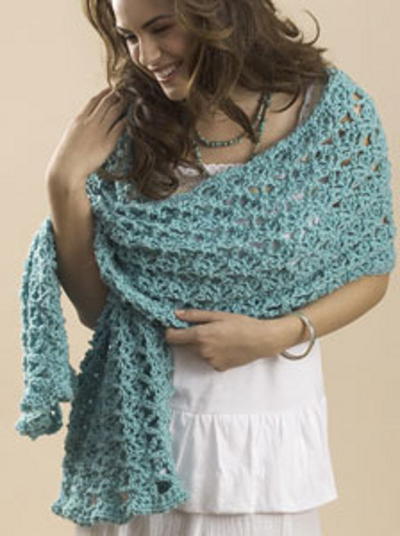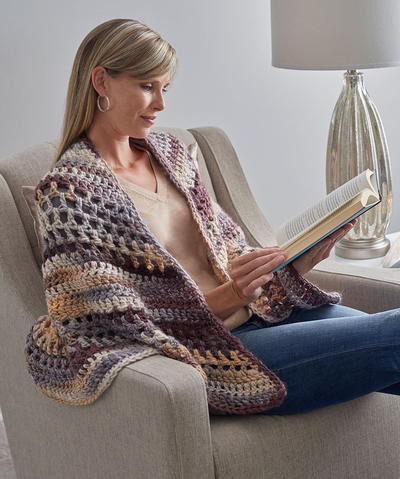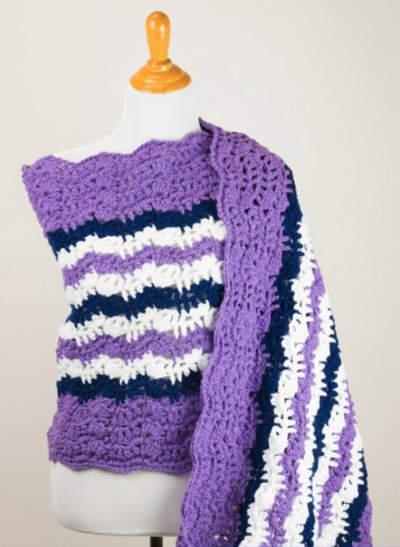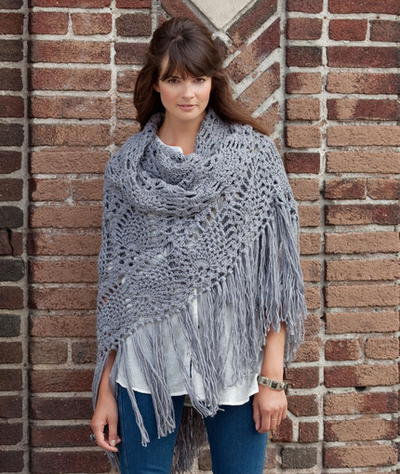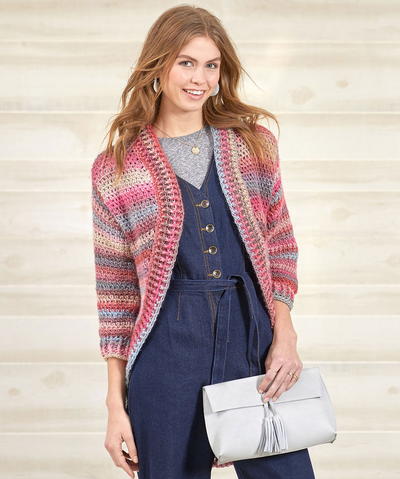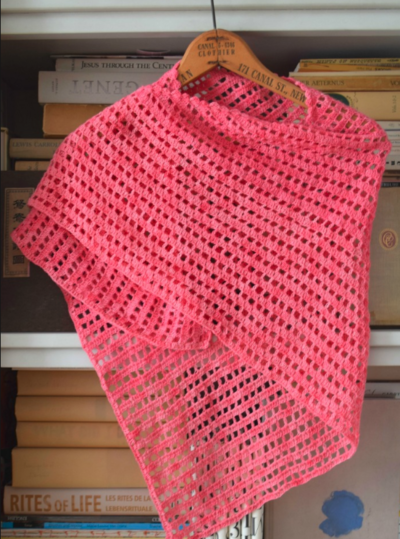Baroque Tunic
This unique crochet pattern from Caron Yarns features baroque-inspired styling, such a lace empire waistband and lace sleeves. The waistband defines the waist on this crochet top without the need for shaping, so it's flattering on any body style. This is a beautiful and elegant crocheted top that is great for dressing up or down and can be worn with a simple skirt or a pair of jeans.
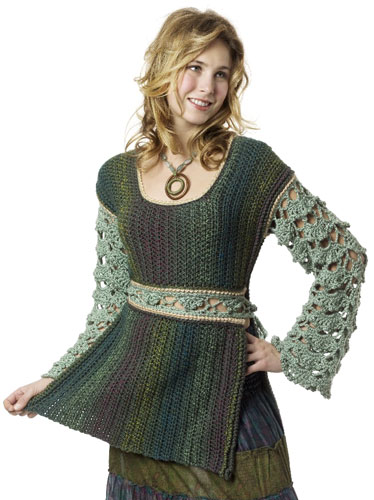
Materials:
- 5 (5, 6, 8, 9, 9) balls Caron International's Simply Soft yarn in Shadows (100% acrylic; 3 oz/85g, 150 yds/137m ball) (A)
- 2 (2, 2, 3, 4, 4) balls Caron International's Simply Soft yarn in Heather (100% Acrylic; 5 oz/141.8 g, 250 yds/228 m ball) (B)
- 1 (all sizes) ball Caron International's Simply Soft yarn in Dark Moss (100% acrylic; 6 oz/170 g, 315 yds/288 m skein) (C)
- 1 (all sizes) ball Caron International's Simply Soft yarn in Woodland Heather (100% acrylic; 6 oz/170 g, 315 yds/288 m skein) (C)
- 1 (all sizes) ball Caron International's Simply Soft yarn in Bone (100% acrylic; 6 oz/170 g, 315 yds/288 m skein) (C)
- US H-8 (5mm) and US I-9 (5.5mm) crochet hooks, or size to obtain gauge
- Stitch markers
- Yarn needle
Gauge: In sleeve pattern, using US H-8 (5mm) hook, one (12 st) repeat and 5 rounds = 3 1/2"/9cm. In half double crochet, using US I-9 (5.5mm) hook, 12 sts and 9 rows = 4"/10cm.
Measurements: Small (Medium, Large, X-Large, XX-Large, XXX-Large)
- Bust: 36 1/2 (40, 45, 49, 52, 62)"/92.5 (101.5, 114.5, 124.5, 132, 157.5) cm
- Length: 26 1/2 (27, 28, 29, 29 1/2, 29 1/2)"/67.5 (68.5, 71, 73.5, 75, 75) cm
Stitches Used: Chain (ch), half double crochet (hdc), double crochet (dc), reverse single crochet (rev sc), single crochet (sc), slip stitch (slip st), treble (tr)
Special Terms:
Fhdc: Foundation half double crochet (This technique creates a foundation chain and a row of half double crochet stitches in one)
- Place a slip knot on hook, ch 3, yarn over, insert hook in 3rd ch from hook and draw up a loop; yarn over and draw through one loop on hook (the "chain"); yarn over and draw through all loops on hook (the "half double crochet").
- The following stitch is worked under the forward 2 loops of the the "chain". Yarn over, insert hook into the face of the "chain" and under the nub at the back of the "chain", draw up a loop, yarn over and draw through one loop on hook (the "chain"), yarn over and draw through all loops on hook (the "half double crochet"). Repeat for the length of foundation.
dc2tog: Double crochet 2 together – Yarn over, insert hook in next stitch, yarn over and pull up a loop, yarn over and draw through two loops on hook (two loops on hook); yarn over, insert hook in next stitch, yarn over and pull up a loop, yarn over and draw through two loops on hook (three loops on hook), yarn over and draw through all three loops on hook.
hdc2tog: Half double crochet 2 together – Yarn over, insert hook in next stitch, yarn over and pull up a loop, (three loops on hook); yarn over, insert hook in next stitch, yarn over and pull up a loop (five loops on hook), yarn over and draw through all five loops on hook.
picot:Ch 4, sc in dc just made.
shell: Dc in next st, picot, [dc in same st, picot] 4 times
Notes:
- Tabard is worked side-to-side with minimal shaping (shoulder slope).
- Sleeves are worked in the round.
- The lace empire waistband and tie-belt are worked in one piece. The waistband defines the waist without waist shaping.
- Sleeves and waistband are crocheted-on with a decorative seam.
- Back is worked separately from front, and then seamed at the shoulders, to show off the unique color-changing "shadows" of the yarn. The color changes will look the same for the plus-sizes because of the side-to-side construction.
- When working sleeves, work only the number of rounds needed to customize the length of the sleeves.
- These instructions occasionally call for working in the third horizontal loop found on the back of each hdc. To locate this loop, look at the top of the hdc, you will see the usual front loop and back loop. Just below the back loop (on the back side of the hdc) there is yet another loop. This is the third horizontal loop.
Instructions:
Front Bodice
There is no RS or WS until bodice is edged.
-
With A and larger hook, leaving a long tail for sewing shoulders, work 35 (36, 37, 38, 39, 38) Fhdc, turn.
- Rows 1–4: Ch 2, hdc in each st across, turn—35 (36, 37, 38, 39, 38) hdc.
Shape First Shoulder
-
Row 5: Ch 2, hdc in each st to last st, 2 hdc in last st, turn—36 (37, 38, 39, 40, 39) hdc.
-
Rows 6–8: Ch 2, hdc in each st across, turn.
-
Repeat Rows 5–8 0 (0, 0, 0, 1, 2) more times—36 (37, 38, 39, 41, 41) hdc.
- Rows 9 (9, 9, 9, 13, 17)–10 (10, 12, 14, 16, 20): Repeat Rows 5 and 6 1 (1, 2, 3, 2, 2) times—37 (38, 40, 42, 43, 43) hdc.
Shape Neck
-
Row 11 (11, 13, 15, 17, 21): Ch 2, hdc in next 16 (16, 17, 18, 19, 19) sts; leave remaining sts unworked (for neck), turn.
-
Rows 12 (12, 14, 16, 18, 22)–27 (31, 35, 37, 39, 43): Ch 2, hdc in each st across, turn.
-
Note: Work first 21 (22, 23, 24, 24, 24) ch of next row loosely enough that it stretches to the same length as the unworked sts of Row 11 (11, 13, 15, 17, 21). The chains will look too loose until the neckline is edged.
- Row 28 (32, 36, 38, 40, 44): Ch 23 (24, 25, 26, 26, 26), hdc in third ch from hook and in each remaining ch and hdc across, turn—37 (38, 40, 42, 43, 43) hdc.
Shape Second Shoulder
-
Row 29 (33, 37, 39, 41, 45): Ch 2, hdc in each st across, turn.
-
Row 30 (34, 38, 40, 42, 46): Ch 2, hdc2tog, hdc in each st across, turn—36 (37, 39, 41, 42, 42) hdc.
-
Repeat last 2 rows 0 (0, 1, 2, 1, 1) more time(s)—36 (37, 38, 39, 41, 41) hdc
-
Row 31 (35, 41, 45, 45, 49)–33 (37, 43, 47, 47, 51): Ch 2, hdc in each st across, turn
-
Row 34 (38, 44, 48, 48, 52): Repeat Row 30 (34, 38, 40, 42, 46)—35 (36, 37, 38, 40, 40) hdc.
- Row 35 (39, 45, 49, 49, 53)–37 (41, 47, 51, 51, 55): Ch 2, hdc in each st across, turn.
Sizes XX-Large (XXX-Large) Only
- Rows 52 (56)–55 (63) Repeat last 4 rows 1 (2) more times—39 (38) hdc.
All Sizes
- Fasten off, leaving a long tail for sewing shoulders.
Front Peplum
-
With A and larger hook, work 35 (36, 37, 38, 38, 38) Fhdc, turn.
- Rows 1 (RS)–37 (41, 47, 51, 55, 63): Ch 2, hdc in each st across, turn—35 (36, 37, 38, 38, 38) hdc.
Edging (right hand side)
-
Row 1 (WS): Ch 2, [2 hdc in next st, hdc in next 2 sts] 3 times, hdc in each remaining st across, do not turn—38 (39, 40, 41, 41, 41) hdc. Note: This row ends at top right corner of peplum.
-
Row 2 (WS): Ch 1, rev sc across working the rev sc in the third horizontal loop found on the back of each hdc to create a raised ridge on the RS of the garment; do not turn.
-
Row 3 (WS): Working in sts of Row 1, ch 2, 2 hdc in next st, hdc in next st, 2 hdc in next st, hdc in each remaining ch across, do not turn—40 (41, 42, 43, 43, 43) hdc.
- Row 4 (WS): Repeat Row 2.
Size XX-Large Only
-
Row 5: Working in sts of Row 3, ch 2, 2 hdc in next st, hdc in next st, 2 hdc in next st, hdc in each remaining ch across, do not turn—45 hdc.
- Row 6: Repeat Row 2.
All Sizes
- Fasten off.
Edging (left hand side)
-
With WS facing, join A with slip st in base of last foundation st (top left corner of peplum).
-
Row 1 (WS): Working along opposite side of foundation row, ch 2, hdc in each st to last 10 sts, [2 hdc in next st, hdc in next 2 sts] 3 times, 2 hdc in last st, do not turn—38 (39, 40, 41, 41, 41) hdc.
-
Row 2 (WS): Ch 1, rev sc across working the rev sc in the third horizontal loop found on the back of each hdc to create a raised ridge on the RS of the garment; do not turn.
-
Row 3 (WS): Working in sts of Row 1, ch 2, hdc in each st to last 3 sts, 2 hdc in next st, hdc in next st, 2 hdc in last st, do not turn—40 (41, 42, 43, 43, 43) hdc.
- Row 4 (WS): Repeat Row 2.
Size XX-Large Only
-
Row 5: Working in sts of Row 3, ch 2, hdc in each st to last 3 sts, 2 hdc in next st, hdc in next st, 2 hdc in last st, do not turn—45 hdc.
- Row 6: Repeat Row 2.
All Sizes
-
Do not fasten off.
- Row 7 (RS): Turn, pivot to work along edge (top of peplum), ch 2, hdc in end of each row across. Fasten off.
Back
-
With A and larger hook, work 78 (80, 82, 84, 85, 84) Fhdc, turn.
- Rows 1–10 (10, 12, 14, 16, 20): Work Rows 1–10 (10, 12, 14, 16, 20) of front bodice—80 (82, 85, 88, 89, 89) hdc.
Shape Neck
-
Row 11 (11, 13, 15, 17, 21): Ch 2, hdc in next 77 (79, 81, 84, 85, 85) sts; leave remaining sts unworked, turn.
-
Rows 12 (12, 14, 16, 18, 22)–27 (31, 35, 37, 39, 43): Ch 2, hdc in each st across, turn.
-
Note: Work first 3 (3, 4, 4, 4, 4) ch of next row loosely enough that it stretches to the same length as the unworked sts of Row 11 (11, 13, 15, 17, 21). The chains will look too loose until the neckline is edged.
-
Row 28 (32, 36, 38, 40, 44): Ch 5 (5, 6, 6, 6, 6), hdc in third ch from hook and in each remaining ch across, hdc in each hdc across, turn—80 (82, 85, 88, 89, 89) hdc.
- Work Rows 29 (33, 37, 39, 41, 45)–37 (41, 47, 51, 55, 63) of front bodice.
Sleeve (Make 2)
-
Beginning at top of sleeve, with smaller hook and B, chain 50 (52, 60, 72, 74, 74); taking care not to twist sts, join with slip st in first ch to form a ring.
-
Round 1 (WS): Ch 8 (counts as dc, ch 5), skip next 3 ch, *sc in next ch, ch 5, skip next 3 ch; repeat from * to last 2 (4, 0, 0, 2, 2) ch, [dc in next ch, ch 1, skip next ch] 1 (2, 0, 0, 1, 1) time(s); join with slip st in 3rd ch of beginning ch, do not turn—12 (12, 15, 18, 18, 18) ch-5 spaces, and 1 (2, 0, 0, 1, 1) ch-1 spaces.
-
Round 2 (WS): Ch 5, sc in first ch-5 space, *8 dc in next ch-5 space (shell made), sc in next ch-5 space, ch 5, sc in next ch-5 space; repeat from * to last 2 ch-5 spaces, shell in next ch-5 space, sc in next ch-5 space, ch 2, [dc in next dc, ch 1] 1 (2, 0, 0, 1, 1) time(s); join with slip st in 3rd ch of beginning ch, turn—4 (4, 5, 6, 6, 6) shells.
-
Round 3 (RS): Ch 1, sc in same st as join, [ch 1, sc in next ch-1 space] 1 (2, 0, 0, 1, 1) time(s), skip next dc, [dc in next dc; ch 4, sc in dc just made (picot made)] 8 times, *sc in next ch-5 space, [dc in next dc, picot] 8 times; repeat from * around; join with slip st in first sc, turn.
-
Round 4: Ch 8, skip first 2 picots, sc in next picot, [ch 5, skip next 2 picots, sc in next picot, ch 5, dc in next sc, ch 5, skip next 2 picots, sc in next picot] 3 (3, 4, 5, 5, 5) times; ch 5, skip next 2 picots, sc in next picot, ch 5, [dc in next sc, ch 1] 1 (2, 0, 0, 1, 1) time(s); join with slip st in 3rd ch of turning ch, do not turn.
-
Repeat Rows 2–4 until sleeve measures approximately 17 1/2"/44.5 cm from beginning.
- Last 2 Rounds: Repeat Rounds 2 and 3. Fasten off.
Top Trim
-
With RS facing and smaller hook, join B with slip st in join on opposite side of foundation ch.
- Round 1: Working along opposite side of foundation ch, ch 1, work 4 sc in each ch-3 space and 3 sc in each ch-1 space around; join with slip st in first sc—51 (54, 60, 72, 75, 75) sc. Fasten off.
Waistband & Tie Belt
-
With smaller hook and B, ch 307 (351, 395, 461, 549, 593).
-
Row 1 (RS): Sc in second ch from hook, skip next 3 ch; dc in next ch, picot, [dc in same ch, picot] 4 times (shell made); skip next 3 ch, sc in next ch, *ch 5, skip next 2 ch, sc in next ch, skip next 3 ch, shell in next ch, skip next 3 ch, sc in next ch; repeat from * across, turn—28 (32, 36, 42, 50, 54) shells.
-
Row 2: Ch 7 (counts as tr, ch 3), *skip next 2 dc, sc in next dc, ch 3, (dc, ch 2, dc) in next ch-5 space, ch 3; repeat from * to last shell, skip next 2 dc, sc in next dc, ch 3, tr in last sc, turn.
- Round 3 (edging): Ch 1, work 4 hdc in each ch-3 space and 3 hdc in each ch-2 space to last ch-3 space, 3 hdc in last ch-3 space, hdc in 4th ch of turning ch; ch 3, sc in hdc just made; pivot to work along side edge, 4 hdc in turning-ch space in side of Row 2, hdc in side of Row 1, ch 3, sc in hdc just made; pivot to work along opposite side of foundation ch, hdc in first ch, 3 hdc in first ch-3 space, 4 hdc in each ch-3 space and 3 hdc in each ch-2 space to last ch-3 space of foundation ch, 3 hdc in last ch-3 space, hdc in last ch, ch 3, sc in hdc just made; pivot to work along side edge, hdc in side of Row 1, 4 hdc around tr in side of Row 2, ch 3, sc in hdc just made; join with slip st in first hdc. Fasten off.
Finishing
-
Choose RS of back and front bodice. Select sides that go well with the striping of the RS of the peplum (RS of peplum has vertical rev sc ridges on sides). Sew shoulder seams.
-
With WS of front bodice facing and larger hook, join yarn in lower corner of bodice.
- Row 1: Ch 2, working in ends of rows, hdc in end of each row across. Fasten off.
Edge Tabard Side (left hand side)
-
With WS facing, join A with slip st in lower left corner of back
-
Row 1 (WS): Ch 2, [2 hdc in next st, hdc in next 2 sts] 3 times, hdc in each remaining st across entire side edge of tabard, skipping shoulder seam, to lower left corner of front bodice, do not turn.
-
Row 2 (WS): Ch 1, rev sc across working the rev sc in the third horizontal loop found on the back of each hdc to create a raised ridge on the RS of the garment; do not turn.
-
Row 3 (WS): Working in sts of Row 1, ch 2, 2 hdc in next st, hdc in next st, 2 hdc in next st, hdc in each remaining ch across, do not turn.
- Row 4 (WS): Repeat Row 2. Fasten off.
Edge Tabard Side (right hand side)
-
With WS facing, join A with slip st in lower right corner of front bodice.
-
Row 1 (WS): Ch 2, hdc in each st across entire side edge of tabard, skipping shoulder seam, to last 10 sts, [2 hdc in next st, hdc in next 2 sts] 3 times, 2 hdc in last st, do not turn.
-
Row 2 (WS): Ch 1, rev sc across working the rev sc in the third horizontal loop found on the back of each hdc to create a raised ridge on the RS of the garment; do not turn.
-
Row 3 (WS): Working in sts of Row 1, ch 2, hdc in each st to last 3 sts, 2 hdc in next st, hdc in next st, 2 hdc in last st, do not turn.
- Row 4 (WS): Repeat Row 2. Fasten off, leaving a long tail for seaming to armhole.
Seam Waistband
-
With RS of front bodice facing and smaller hook, join C with slip st in lower corner of bodice.
-
Row 1: Working in ends of rows across lower edge of bodice, slip st in the third horizontal loop found on the back of each hdc across, do not turn.
-
Row 2: Center front bodice over RS of top edge of waistband, aligning sts; ch 1, inserting hook into one loop of each slip st of Row 1 and in third horizontal loop found on back of corresponding hdc of waistband, work rev sc across. Fasten off.
- Seam other edge of waist band to peplum in same manner.
Seam Armhole
-
Locate join at end of first round of sleeve, place marker in join. Flatten sleeve to locate stitch directly opposite of join and place another marker. Count the stitches between the markers (there may be an additional stitch on one-half of sleeve than on the other). Beginning at shoulder seam, count down the front bodice the number of sts of one side of sleeve and place marker. Beginning at shoulder seam, count down the back the number of sts of other side of sleeve and place marker. With RS facing and smaller hook, join C with slip st in armhole at marker.
-
Row 1: Ch 1, slip st in each st around armhole (between markers), do not turn.
-
Row 2: Align join marker of sleeve with armhole markers, and opposite marker of sleeve with shoulder seam; ch 1, inserting hook into back loop of each slip st of Row 1, nearby loop of armhole st holding the slip st, and back loop of corresponding st of sleeve, work rev sc across. Fasten off.
- Seam sides of bodice and back from armhole to waistband.
Neck Trim
-
With RS facing and larger hook, join A with slip st in back neck.
-
Round 1: Ch 1, *sc evenly spaced to 2 sts before lower front corner, hdc in next st, dc2tog over next st and st following corner st, hdc in next st; repeat from * one more time, sc evenly spaced around; join with slip in first sc. Fasten off.
-
Round 2: With RS facing, join C with slip st in back neck. ch 1, working in back loops only, slip st in each st around, skipping 1 st in each front corner; join with slip st in first st, do not turn.
-
Round 3: Ch 1, working in back loops only, rev sc in each slip st around; join with slip st in first st. Fasten off.
- Using yarn needle, weave in all ends. Briefly steam-blocking sleeves will lengthen them and flatten picots slightly, if desired. Steam-blocking the rest of this garment is not recommended.
Your Recently Viewed Projects
MarciaPurse
Apr 06, 2018
The materials, including 3 colors marked C, are pretty embarrassing. It took me awhile to figure it out, but after considerable research, I find it's fairly clear that the first C, Dark Moss, is actually the same color as A, which has an incomplete description, just saying "Shadows." Dark Moss IS a discontinued Shadows color. Similarly, the second C must be B, because once again the description of B is incomplete. The real color C, then is Bone.
tlhar22
Feb 27, 2018
In the pattern you have listed three colors of letter C...in the instructions I only see the letter C twice but it doesn't say if you use all three colors or just one....can you help
MarciaPurse
Apr 06, 2018
See my comment above, Tlhar22. I think I've figured it out. Unfortunately, the tabard yarn is discontinued. I'm now searching for an alternative.
mareenlumma 060311 8
Dec 28, 2016
I have a question to this tunic. Does the 2 first chains in the row replace the first hdc?
Editor Dana
Jan 03, 2017
Hi there! I believe the first two chains replace the first hdc, or count as the first hdc across. A resource states, "The turning chain almost always counts as the first stitch of the next row, except for the single crochet." Make sure you count your rows and end up with the correct amount of stitches each time and you should be good! I hope that helps!
sarah 9748876
Feb 26, 2011
I've made a start three times on this pattern as I love it. However the gauge is REALLY weird. In HDC, I'm only just getting close using 6mm hook, and with a 5.5mm hook, the tension was too tight, and I'm crocheting very loosely for me. Be aware that if you crochet to standard tensions, then you will need bigger hooks for this pattern!
DebbieGoldman
Jul 31, 2010
A tabard is a short coat, either sleeveless, or with short sleeves or shoulder pieces, which was a common item of men's clothing in the Middle Ages
Report Inappropriate Comment
Are you sure you would like to report this comment? It will be flagged for our moderators to take action.
Thank you for taking the time to improve the content on our site.

